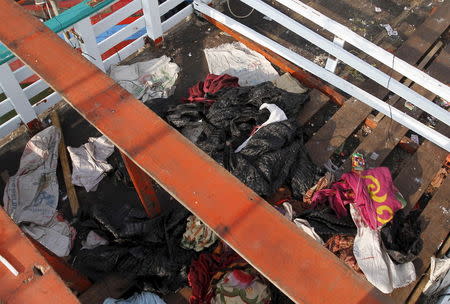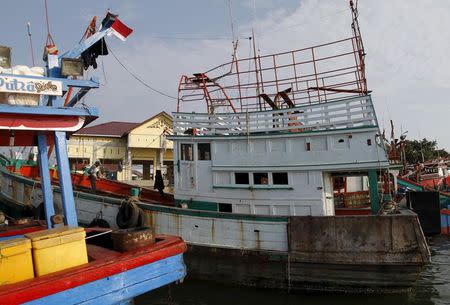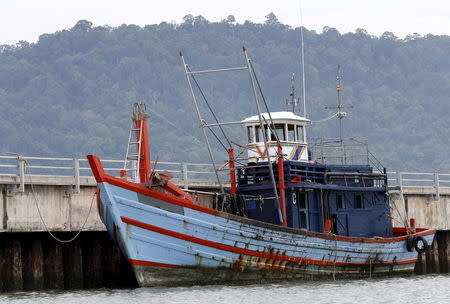Asia boatpeople pushed back to sea as U.N. calls for rescue
By Amy Sawitta Lefevre and Fransiska Nangoy BANGKOK/JAKARTA (Reuters) - Thailand, Malaysia and Indonesia will continue to push boats holding thousands of migrants back to sea, a senior Thai official said on Wednesday, despite a U.N. appeal for a rapid rescue operation to avoid a humanitarian crisis. Several thousand migrants, many of them hungry and sick, are adrift in Southeast Asian seas in boats that have been abandoned by smugglers following a Thai government crackdown on human trafficking, the United Nations has said. "Indonesia, Malaysia and Thailand have decided not to receive boat people, as far as I am aware," Major General Werachon Sukhondhapatipak, spokesman for Thailand's ruling junta, told Reuters. He declined to comment on the UN refugee agency UNHCR's appeal on Tuesday for an international search and rescue operation for the many stranded on the seas between Thailand, Malaysia and Indonesia. Malaysia's Home Ministry also declined to comment on the UN rescue appeal. The issue would be discussed at a meeting of 15 countries, to be held in Bangkok on May 29, Werachon said. In Thailand, authorities are enforcing a long-held policy to push boats back. The policy involves offering food, water fuel and medical assistance to migrant boats but preventing them from landing. There has been a surge in migrants from impoverished Bangladesh and Myanmar to Malaysia and Indonesia following the clampdown in Thailand, usually the first destination in the region's people-smuggling network. Thailand ordered a clean-up of suspected traffickers' camps last week after 33 bodies, believed to be of migrants from Myanmar and Bangladesh, were found in shallow graves near the Malaysian border. That has led to many migrants being left out at sea. 'IT'S A POLICY MATTER' But a senior Malaysian maritime official said on Tuesday, after over 1,000 people arrived on the Malaysian island of Langkawi at the weekend, that any more boats trying to land would be turned back "We don't allow them in," said First Admiral Tan Kok Kwee, northern region head of the Malaysian Maritime Enforcement Agency. "It's a policy matter." Indonesia provided food, water and medical supplies to around 500 passengers on a boat off the coast of the northwestern province of Aceh on Monday, before sending the vessel toward Malaysia. The Indonesian Navy said the passengers of the boat they sent onwards wanted to go to Malaysia, not Indonesia. A day earlier and also in Aceh, Indonesia rescued nearly 600 migrants from overcrowded wooden boats. Those migrants were brought ashore and remain on Aceh. The Indonesian policy was to offer food and shelter to refugees and coordinate with international migrant and refugee bodies, Foreign Ministry spokesman Armanatha Nasir told reporters on Wednesday. This it had done with the nearly 600 migrants it rescued on Sunday, he added. "What we do not do what is load them on to the ship and push it to the ocean," he said. But advocacy group ASEAN Parliamentarians for Human Rights criticised the Indonesian government for sending the boat back to sea on Monday. "Towing migrants out to sea and declaring that they aren't your problem any more is not a solution to the wider regional crisis," ABHR Chairperson and Malaysian lawmaker Charles Santiago said in a statement. Many of the arrivals are Rohingya, a stateless Muslim minority from Myanmar described by the United Nations as one of the most persecuted minorities in the world. 'BLOOD ON THEIR HANDS' An estimated 25,000 Bangladeshis and Rohingya boarded rickety smugglers' boats in the first three months of this year, twice as many in the same period of 2014, the UNHCR has said. "When countries such as Thailand implement a push back policy, we find Rohingya bodies washing ashore," said Sunai Phasuk at Human Rights Watch in Thailand. "If these three countries move forward with push backs, blood will be on their hands." Malaysia's police chief said that joint work with the Thai police force had helped Malaysian police smash seven syndicates involved in smuggling and trafficking in March and April. The syndicates operated in northern Malaysia and southern Thailand, Khalid Abu Bakar told reporters on the Thai island of Phuket, where members of the two police forces met this week for annual talks on international crime. Among 38 people arrested were two Malaysian policemen, he said. As well as trafficking, Malaysian police believe the syndicates were involved in forging UNHCR documents, he said. The Thai police said they had asked for Malaysian cooperation in detaining those facing arrest warrants in Thailand. "From now on there will be better exchange of information with Malaysia regarding human trafficking," Thai police spokesman Lieutenant General Prawut Thawornsiri said. "We have always conducted these talks with Malaysia but this year it is a big issue that needs to be dealt with. The entire world is watching us." (Additional reporting by Fransiska Nangoy in JAKARTA and Apichai Thornoi in PHUKET, Thailand; Writing by Simon Webb; Editing by Nick Macfie)




